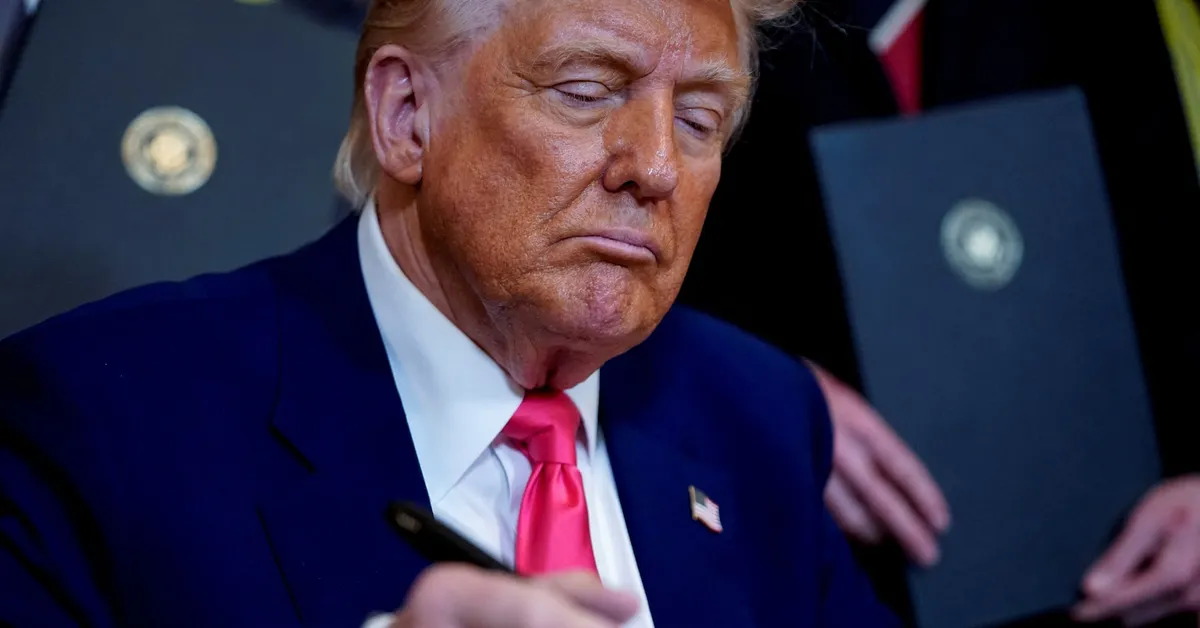
New York, Aug 14 (Reuters) - A recent executive order signed by U.S. President Donald Trump aims to prevent banks from discriminating against their clients based on political or religious beliefs. However, this move could lead to significant uncertainty and administrative challenges for the banking industry, according to various sources. The executive order, signed on Thursday, mandates that the Treasury Department and bank regulators ensure that lenders do not have policies that deny services to customers because of their political or religious affiliations, a practice commonly referred to as debanking.
The executive order outlines potential consequences for banks found to be in violation of this directive. Any infractions could lead to fines, disciplinary action, and even referrals to the Justice Department. Previously, banks have claimed that certain account closures were necessary due to reputational risks; however, such practices are now prohibited by this new order. Additionally, regulators have been given approximately 180 days to conduct a comprehensive review of banking practices in relation to this directive.
While some financial institutions have welcomed Trump's executive order for its potential to simplify processes, they have also voiced concerns regarding the complexities of compliance. Experts and industry officials have expressed unease about the order's broad language and the extent to which regulators will enforce it. “There are terms in the executive order that can be subject to interpretation,” said Matt Bisanz, a partner at Mayer Brown. “We will need to monitor how regulators interpret these terms and the activities they prioritize.”
It remains uncertain whether regulators will implement formal regulations or simply provide guidance that will be enforced through the bank examination process. Bisanz added that the enforcement could either be overt or handled quietly, without public scrutiny.
Trump's criticism of banking practices aligns with longstanding complaints from Republicans, who have accused major Wall Street banks of engaging in woke capitalism by denying services to gun manufacturers, fossil fuel companies, and other entities perceived to lean politically right. In a statement regarding the new executive order, Jonathan Gould, the Comptroller of the Currency, emphasized that fair access to financial services is a core principle of the U.S. banking system. He stated, “It is unacceptable for banks to discriminate against any customer based on political or religious beliefs or lawful business activities.”
The OCC, which oversees national banks, is currently evaluating banking policies to identify any that may be improper, pledging to take corrective actions as necessary. However, spokespeople for the Federal Reserve and the Federal Deposit Insurance Corporation have not disclosed their plans regarding the implementation of the executive order.
According to three anonymous industry sources, numerous questions regarding this executive order persist and may only be clarified once regulators provide explicit rules on debanking. Another industry source commented that it is premature to assess the compliance burden of the order, given the current lack of detailed information.
Furthermore, banks could encounter various challenges if they are required to reassess and possibly renew client relationships in light of the debanking order. Stephen Gannon, a partner at Davis Wright Tremaine, noted that the reinstatement or modification of client arrangements, as suggested by the order, would necessitate analyzing extensive data on client activities and products.
Regulators are not expected to impose penalties for past account closures; however, they may require banks to disclose the reasons behind previous instances of debanking, according to two sources familiar with the discussions. Following the announcement of the executive order, banks may face regulatory penalties if they do not implement the new debanking guidelines effectively, warned Ed Mills, an analyst at Raymond James, a financial services firm.
Reporting by Nupur Anand and Saeez Azhar in New York and Pete Schroeder in Washington; Editing by Lananh Nguyen and Andrea Ricci.
Nupur Anand serves as a U.S. banking correspondent for Reuters in New York, focusing on major banks like JPMorgan Chase and Wells Fargo. With over a decade of experience covering banking and finance in India, Anand has reported on significant financial collapses and the turmoil within digital banks and cryptocurrencies. She holds a degree in English literature from Delhi University and a postgraduate diploma in journalism from the Indian Institute of Journalism & New Media in Bangalore. Anand is also an award-winning fiction writer.
Saeed Azhar is a financial journalist with Reuters, specializing in the U.S. banking sector. He has a background in covering prominent banks such as Goldman Sachs and Bank of America, as well as regional banks. Prior to relocating to New York in July 2022, he led the finance team in the Middle East from Dubai and has experience covering finance in Southeast Asia.